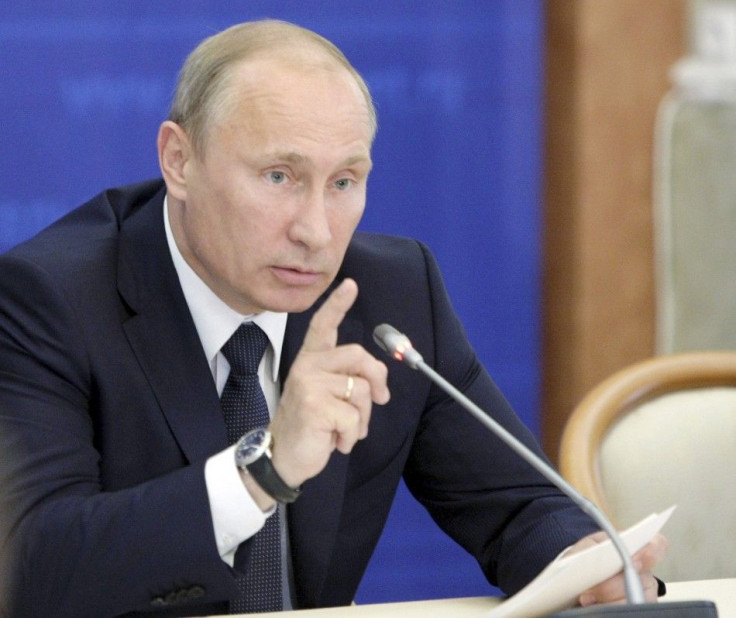Russia's Putin Orders Investment, Labor Shake-Up

MOSCOW, May 7 (Reuters) - Vladimir Putin ordered Russia's government to boost investment and shake up state-run industries in a flurry of decrees issued after he returned to the presidency on Monday with a call for a new economy.
Putin set out long-term economic and social goals in the orders, issued on the first day of a six-year presidency during which he will face pressure to improve Russia's business climate, shrink the state's role and ease reliance on energy exports.
Putin ordered the government to take measures to raise capital investment to no less than 25 percent of GDP in 2015, from the current level of 20 percent, and to create 25 million high productivity jobs by 2020.
He also called for a 50 percent increase in labour productivity by 2018 and a 30 percent increase in the share of high tech products in GDP in order to lessen Russia's dependency on natural resources.
Putin, who has repeatedly spoken out against corruption and red tape, with little obvious success, during his 12 years in power, also said he wanted Russia to climb from the 120th place it occupies now in the World Bank's Doing Business index to 50th place in 2015, and 20th place in 2018.
The orders from Putin, who ran Russia as president from 2000-2008 and then as prime minister until Monday's inauguration ceremony, reflected an acknowledgement of the need to attract more investment and diversify the economy.
In his address after taking the oath of office, Putin said that the lives of future generations, the historic prospects of our state and nation depend on ... real successes in creating a new economy and modern standards of living.
After the ceremony, Putin sent a letter to the speaker of the State Duma lower house of parliament, asking legislators to approve the candidacy of former President Dmitry Medvedev as prime minister. He is expected to be confirmed on Tuesday.
Putin's decrees formalise ideas and goals he expressed in speeches and articles during the presidential election campaign.
STATE CORPORATIONS
The decrees set tough goals for Medvedev, who is expected to be a much weaker prime minister than his predecessor Putin, with many insiders predicting Medvedev's time on the job is limited.
Many of these targets are more or less achievable. The main thing is not the numbers but the measures which will be taken to achieve these targets, said Kseniya Yudayeva, chief economist at Russia's top lender, Sberbank.
The move to the 20th place in the Doing Business index is a very ambitious goal and one should bear in mind that the competitors are setting similar targets, she said.
Putin and Medvedev are yet to announce their choices for ministerial jobs. Medvedev would like to squeeze political heavyweights like Deputy Prime Minister Igor Sechin out of the government and bring in his loyalists.
In line with the law, the government resigned on Monday, with Deputy Prime Minister Viktor Zubkov becoming an acting prime minister until Medvedev's appointment. Medvedev will have two weeks to form the new cabinet.
In the decrees, Putin said he wanted the government to sell its stakes in firms which do not belong to natural resources or defence sectors and are not natural monopolies. That would require a change to the state's privatisation programme when he wanted in place by Nov. 1, he added.
During Medvedev's presidency Russia drafted an ambitious $32 billion privatisation plan but little progress has been made while the role of the state in the economy has continued to grow.
Yudayeva said that Putin did not have an aversion to the privatisation and his previous presidency saw several successful IPOs by state-run companies. She said that the current market was more difficult for privatisation but suggested that a selloff of a number of smaller assets was likely.
Putin also wanted to limit acquisitions by state-controlled companies, which should also come up with schedules for non-core asset sales by Dec. 1.
The decree asked the government to analyse the efficiency of three state corporations whose activity is regulated by special laws and which receive capital injections from the budget.
Putin said he wanted the government to look into United Aviation Company, United Shipbuilding Company and Russian Technologies which owns assets in defence and car industry, in order to prepare proposals aimed at improving their management.
Putin also asked the government to present proposals by June 1, 2012 on the reform of the government procurement system with obligatory public hearings on all state orders exceeding 1 billion roubles ($33.63 million).
Putin called for an increase in real wages by 40-50 percent by 2018 and said average mortgage rate should not exceed inflation by more than 2.2 percentage points.
© Copyright Thomson Reuters 2024. All rights reserved.











